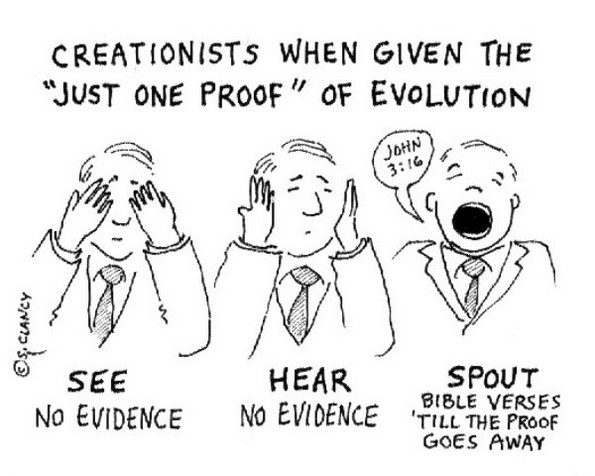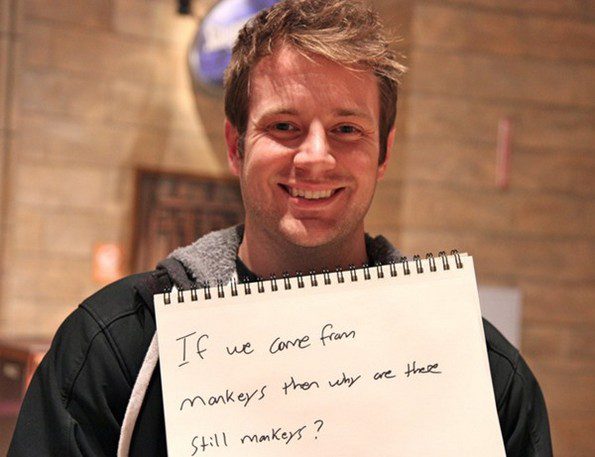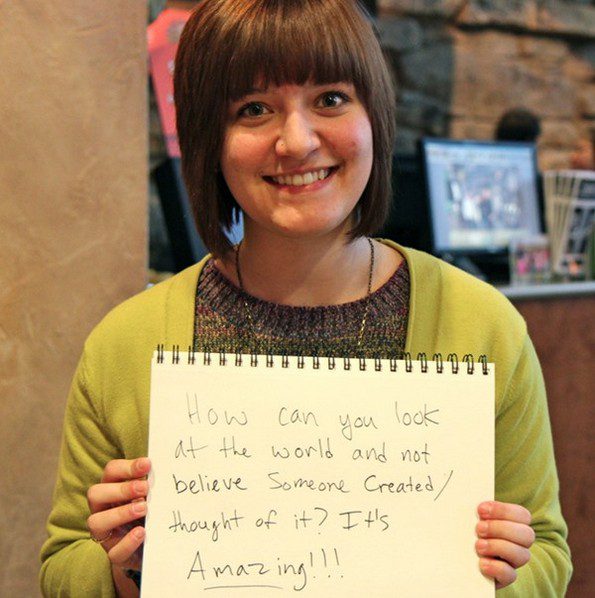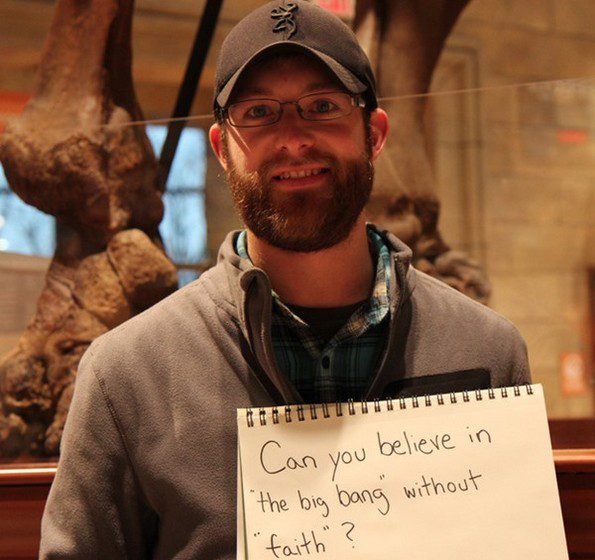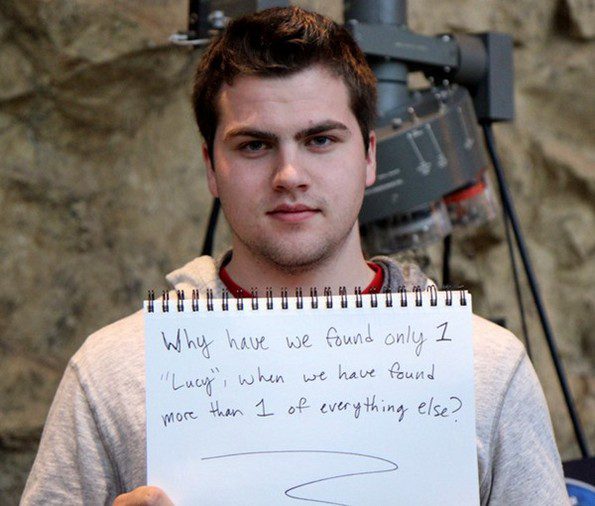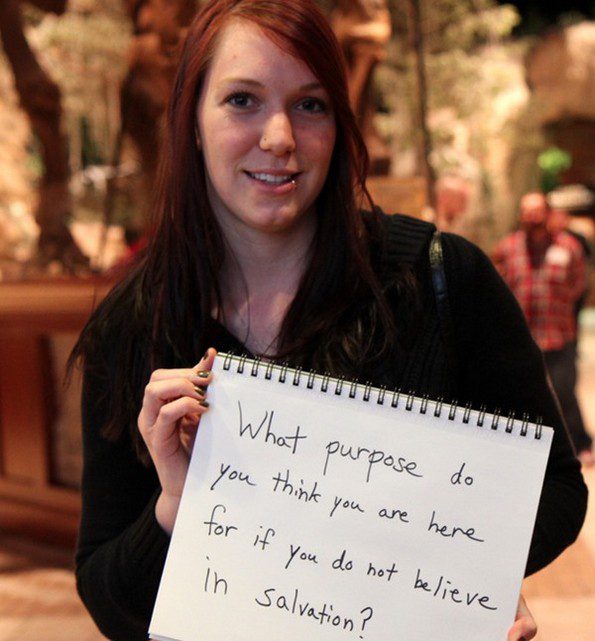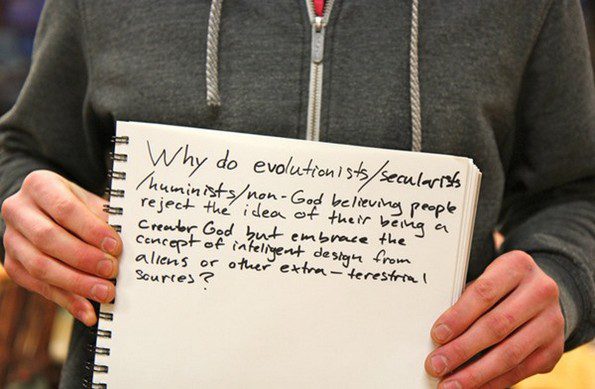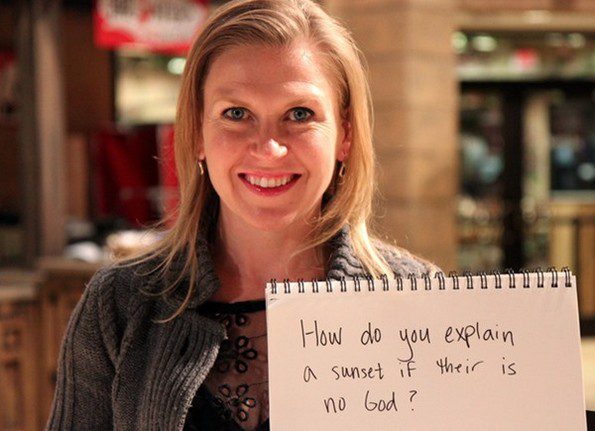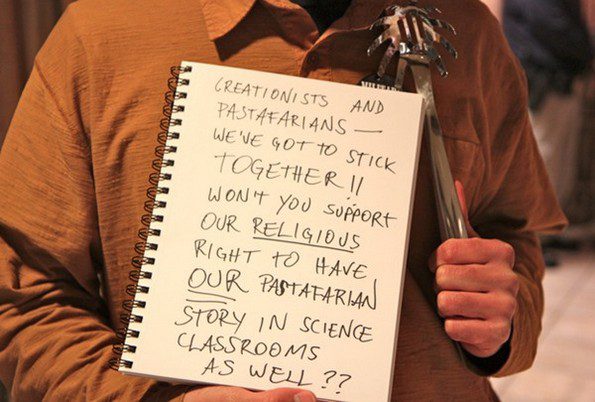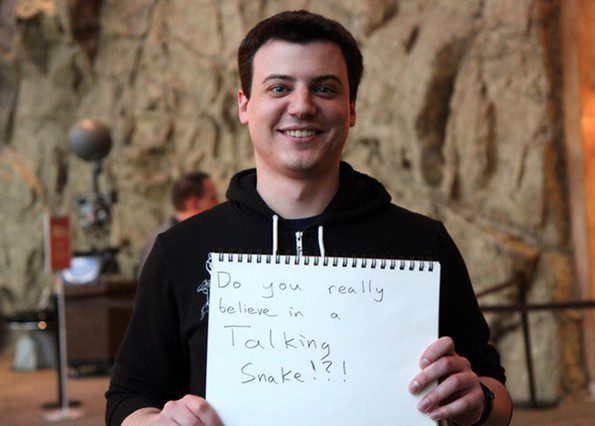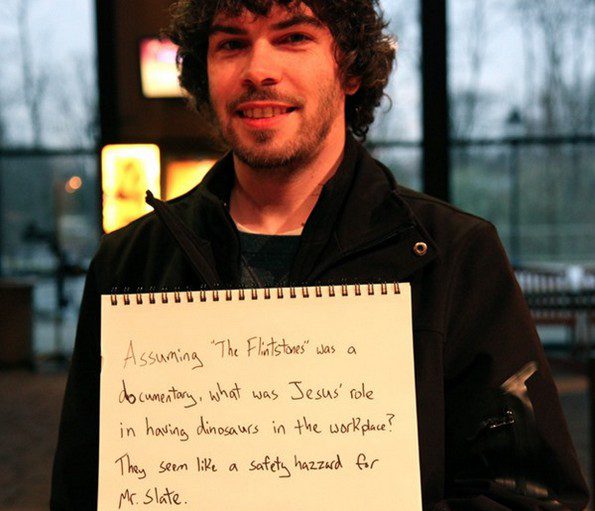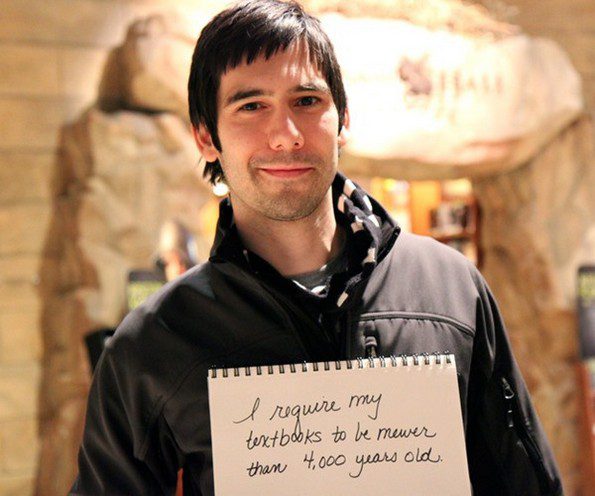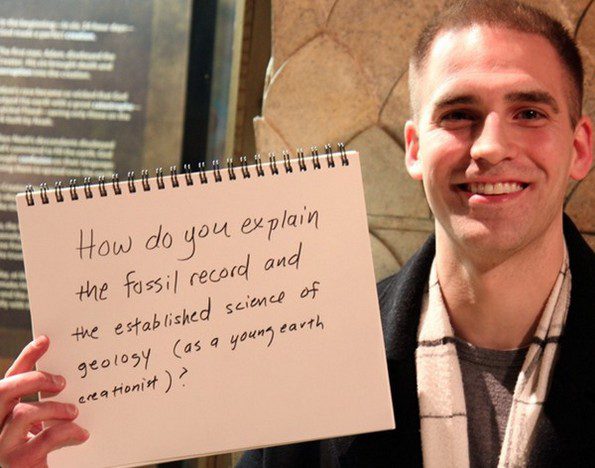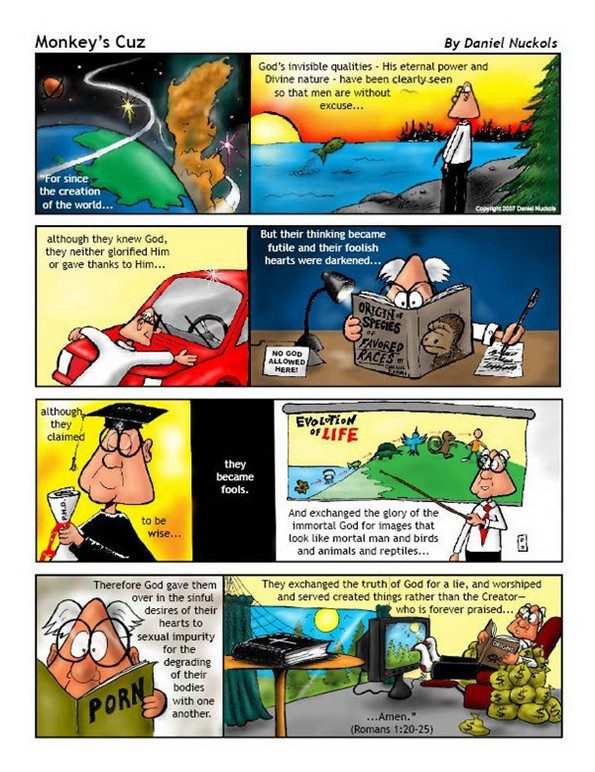
Early last year, Ken Ham debated Bill Nye on creationism/evolution. Bill Cohen, writing for The Daily Banter, summed up the debate nicely:
Bill Nye: We don’t know how the universe came about, that’s why we do science.
Ken Ham: There’s a book (Bible) that explains it all!!
Bill Nye: We don’t know how or why consciousness arose, but we use science to try and understand it.
Ken Ham: There’s a book that explains it all!!
Bill Nye: We know for a scientific fact that the world is older than 6000 years because of carbon dating, fossil records, genetics and the study of DNA etc etc.
Ken Ham: There’s a book that says otherwise!!
Al Mohler, the fundamentalist Southern Baptist president of Southern Baptist Theological Seminary, attended the debate. He posted his thoughts about the debate on his blog. (though it seems this post was written BEFORE the debate took place) Here is what Mohler had to say:
…As the debate began, it was clear that Ham and Nye do not even agree on definitions. The most friction on definition came when Nye rejected Ham’s distinction between “historical science” and “observational science” out of hand. Nye maintained his argument that science is a unitary method, without any distinction between historical and observational modes. Ham pressed his case that science cannot begin without making certain assumptions about the past, which cannot be observed. Furthermore, Ham rightly insisted that observational science generally does not require any specific commitment to a model of historical science. In other words, both evolutionists and creationists do similar experimental science, and sometimes even side-by-side.
Nye’s main presentation contained a clear rejection of biblical Christianity. At several points in the debate, he dismissed the Bible’s account of Noah and the ark as unbelievable. Oddly, he even made this a major point in his most lengthy argument. As any informed observer would have anticipated, Nye based his argument on the modern consensus and went to the customary lines of evidence, from fossils to ice rods. Ham argued back with fossil and geological arguments of his own. Those portions of the debate did not advance the arguments much past where they were left in the late nineteenth century, with both sides attempting to keep score by rocks and fossils…
…In this light, the debate proved both sides right on one central point: If you agreed with Bill Nye you would agree with his reading of the evidence. The same was equally true for those who entered the room agreeing with Ken Ham; they would agree with his interpretation of the evidence.
That’s because the argument was never really about ice rods and sediment layers. It was about the most basic of all intellectual presuppositions: How do we know anything at all? On what basis do we grant intellectual authority? Is the universe self-contained and self-explanatory? Is there a Creator, and can we know him?
On those questions, Ham and Nye were separated by infinite intellectual space. They shared the stage, but they do not live in the same intellectual world. Nye is truly committed to a materialistic and naturalistic worldview. Ham is an evangelical Christian committed to the authority of the Bible. The clash of ultimate worldview questions was vividly displayed for all to see.
When asked how matter came to exist and how consciousness arose, Nye responded simply and honestly: “I don’t know.” Responding to the same questions, Ham went straight to the Bible, pointing to the Genesis narrative as a full and singular answer to these questions. Nye went on the attack whenever Ham cited the Bible, referring to the implausibility of believing what he kept describing as “Ken Ham’s interpretation of a 3,000 year old book translated into American English.”
To Bill Nye, the idea of divine revelation is apparently nonsensical. He ridiculed the very idea.
This is where the debate was most important. Both men were asked if any evidence could ever force them to change their basic understanding. Ham said no, pointing to the authority of Scripture. Nye said that evidence for creation would change his mind. But Nye made clear that he was unconditionally committed to a naturalistic worldview, which would make such evidence impossible. Neither man is actually willing to allow for any dispositive evidence to change his mind. Both operate in basically closed intellectual systems. The main problem is that Ken Ham knows this to be the case, but Bill Nye apparently does not. Ham was consistently bold in citing his confidence in God, in the gospel of Jesus Christ, and in the full authority and divine inspiration of the Bible. He never pulled a punch or hid behind an argument. Nye seems to believe that he is genuinely open to any and all new information, but it is clear that his ultimate intellectual authority is the prevailing scientific consensus. More than once he asserted a virtually unblemished confidence in the ability of modern science to correct itself. He steadfastly refused to admit that any intellectual presuppositions color his own judgment.
But the single most defining moments in the debate came as Bill Nye repeatedly cited the “reasonable man” argument in his presentation and responses. He cited Adolphe Quetelet’s famed l’homme moyen—“a reasonable man”—as the measure of his intellectual authority. Writing in 1835, Quetelet, a French intellectual, made his “reasonable man” famous. The “reasonable man” is a man of intellect and education and knowledge who can judge evidence and arguments and function as an intellectual authority on his own two feet. The “reasonable man” is a truly modern man. Very quickly, jurists seized on the “reasonable man” to define the law and lawyers used him to make arguments before juries. A “reasonable man” would interpret the evidence and make a reasoned judgment, free from intellectual pressure.
Bill Nye repeatedly cited the reasonable man in making his arguments. He is a firm believer in autonomous human reason and the ability of the human intellect to solve the great problems of existence without any need of divine revelation. He spoke of modern science revealing “what we all can know” as it operates on the basis of natural laws. As Nye sees it, Ken Ham has a worldview, but Nye does not. He referred to “Ken Ham’s worldview,” but claimed that science merely provides knowledge. He sees himself as the quintessential “reasonable man,” and he repeatedly dismissed Christian arguments as “not reasonable.”…
…The ark is not the real problem; autonomous human reason is. Bill Nye is a true believer in human reason and the ability of modern science to deliver us. Humanity is just “one germ away” from extinction, he said. But science provides him with the joy of discovery and understanding…
…The problem with human reason is that it, along with every other aspect of our humanity, was corrupted by the fall. This is what theologians refer to as the “noetic effects of the fall.” We have not lost the ability to know all things, but we have lost the ability to know them on our own authority and power. We are completely dependent upon divine revelation for the answers to the most important questions of life. Our sin keeps us from seeing what is right before our eyes in nature. We are dependent upon the God who loves us enough to reveal himself to us—and to give us his Word.
As it turns out, the reality and authority of divine revelation, more than any other issue, was what the debate last night was all about…
..It was about the central worldview clash of our times, and of any time: the clash between the worldview of the self-declared “reasonable man” and the worldview of the sinner saved by grace…
I quite agree with Al Mohler. This indeed is a clash of worldviews. Where I disagree, of course, is that I believe the creationist/Christian worldview is outdated, inadequate, and often contrary to what we now know about the universe and our place in it. For Al Mohler and Ken Ham, their worldview begins and ends with Bible. Any fact, evidence, or truth that does not fit the Bible paradigm, which is really Mohler’s and Ham’s personal interpretation of the Bible, must be rejected.
